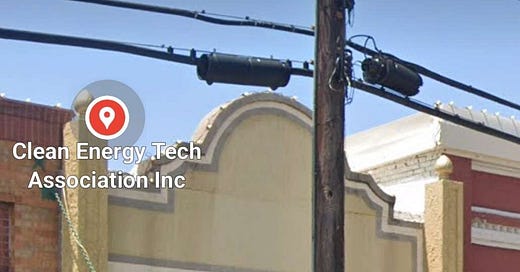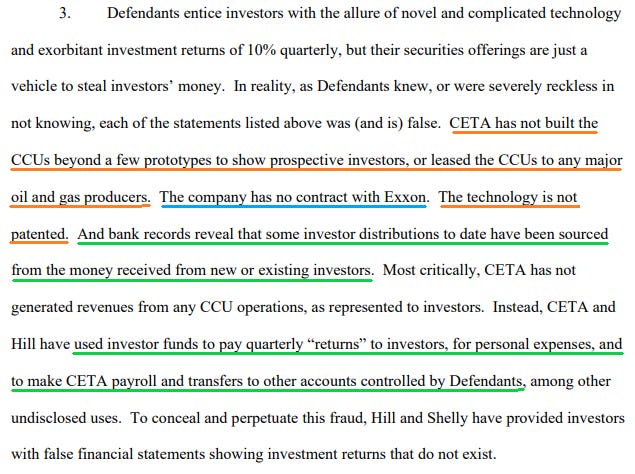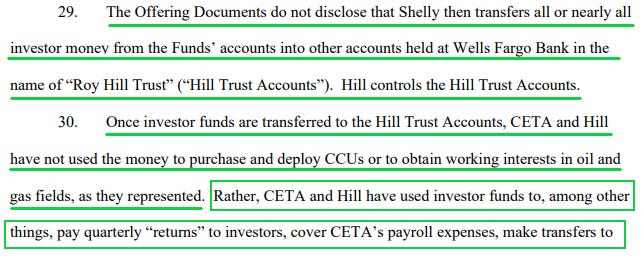CCU Fraud Alert from SEC
When the Securities and Exchange Commission(SEC) brings a lawsuit against your entity for fraud it’s usually game over for those involved but for the many outsiders looking in, it’s the first opportunity to truly understand and unravel the mechanics of the crimes. A recent filing in May against Roy W. Hill, Eric N. Shelly, Clean Energy Technology Association, Inc., and Freedom Impact Consulting, LLC, is packed with flavor including a $155M fraudulent Oil and Gas offering, fake or non existent patents used to promote a carbon capture technology, 10% rate of returns and 75% net cashflow, and paying past investors with new investor money in true Ponzi style. All this ran by a few individuals, including a dentist, out of a hole in the wall office in Fairfield, Texas that reminds one of a shady law office in your downtown.
The scheme seems fairly classic where a promised rate of return is put in front of potential investors that sounds obtainable due to top caliber partnerships with major corporations in need of the products or services the company provides and attach said product with the current emphasis on a trend that allows management to sell a story over results. In the case of Clean Energy Technology Association(CETA), the partnership was with Exxon mobile and the technologies leveraged were Carbon Capture Utilization(CCU).
According to a previous investor overview with the goal to raise $60M, the company laid out its multi-year research and development that according to them lead to 3 patents where the technology was tested and proven. The management is said to have an extensive amount of operating experience in the Oil and Gas industry with a combined total of 250 years but further research reveals that the company only had 4 employees at the time making that an impossible metric to meet. It is also important to put experience into context in the oil and gas industry of the past versus the present. Someone in their early 30s can have as much experience in new technologies as a veteran with 30 years because that tech didn’t exist a decade ago from drilling to carbon capture.
CETA originated the patents in 2018 according to the presentation and deployed 10’s of millions into research and development to create products called COALlite, CETASolve and SynGas. The company claimed these products could be used in commercial applications including transforming coal into marketable by-products such as feedstock for energy production and manufacturing of cosmetics, pharmaceuticals, and agriculture. The company even toted relationships with the Department of Energy(DOE) and many Oil and Gas companies and their refineries. But Oil and Gas enhanced recovery on its own isn’t sexy giving way for the company to promote its carbon capture environmental importance and software investments that help monitor the efficiencies of the system.
The presentation continues with reference to an opt-in contract with a major oil company which the lawsuit explains is Exxon but the company had no actual contracts with. ‘CETA’s conservative and fiscally forward-thinking’ guidance by its directors with 250 years of combined experience allowed them to peg a $162.50/bbl on oil with little explanation as to how this was derived.
In reality these presentations where used to garnish more capital from new investors to ensure distribution to previous investors in the form of cash. The solicitation of new investors was ongoing as early as March 2023 where once the company acquired the funds it would transfer them to new bank accounts including paying personal expenses.
In an interview on The Passive Investing Show Eric Shelly describes the company:
" Our revenue stream is actually oil revenue from the added production... we get a percentage of that... but its not based on the volatile price you see in the market right now..."
"They have a solvent that can actually remove CO2 from natural gas and exhaust and various other gas streams... they developed this equipment to be portable... They have this equipment and this solvent patented"
According to the SEC lawsuit only a few prototypes have been developed to show investors and the technology is NOT patented. Shelly did many interviews promoting the technologies including claims of face-to-face meetings with Exxon to deploy hundreds to thousands of units.
The company leveraging Carbon Capture technologies that they do not have access to in order to sell investors on is a major damper to the Oil and Gas industry as a whole as the world struggles with the complex landscape of energy transition. CETA claims included metrics of 90% removal of CO2 from natural gas streams which if capable of delivering on would be a huge net benefit for the industry and environment.
According to Allied Market Research the global carbon capture, utilization, and storage market was valued at $1.9B in 2020 and projected to reach $7.0 billion by 2030, growing at a CAGR of 13.8% from 2021 to 2030. The IEA says CCUS accounts for nearly 15% of the cumulative reduction in emissions in the Sustainable Development Scenario. Moving the net-zero goalposts from 2070 to 2050 would require almost 50% more CCUS deployment. The Oil and Gas industry already carries a bad reputation with environmentalists and investors from companies raising capital on false promises to chasing growth with no returns. With every fraud there is a success story in this industry, with leaps in technologies for an ever growing need for reliable energy giving way for just as much incentive to deliver on real CCUS products that will be needed in the energy transition.
















